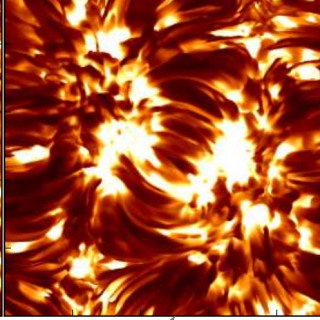Bibcode
Alsina Ballester, E.; Belluzzi, L.; Trujillo Bueno, J.
Bibliographical reference
The Astrophysical Journal, Volume 880, Issue 2, article id. 85, 12 pp. (2019).
Advertised on:
8
2019
Journal
Citations
14
Refereed citations
13
Description
The linear polarization produced by scattering processes in the hydrogen
Lyα line of the solar disk radiation is a key observable for
probing the chromosphere–corona transition region (TR) and the
underlying chromospheric plasma. While the line-center signal encodes
information on the magnetic field and the three-dimensional structure of
the TR, the sizable scattering polarization signals that the joint
action of partial frequency redistribution and J-state interference
produce in the Lyα wings have generally been thought to be
sensitive only to the thermal structure of the solar atmosphere. Here we
show that the wings of the Q/I and U/I scattering polarization profiles
of this line are actually sensitive to the presence of chromospheric
magnetic fields, with strengths similar to those that produce the Hanle
effect in the line core (i.e., between 5 and 100 G, approximately). In
spite of the fact that the Zeeman splitting induced by such weak fields
is very small compared to the total width of the line, the
magneto-optical effects that couple the transfer equations for Stokes Q
and U are actually able to produce sizable changes in the Q/I and U/I
wings. We find that magnetic fields with longitudinal components larger
than 100 G produce an almost complete depolarization of the wings of the
Lyα Q/I profiles within a ±5 Å spectral range around
the line center, while stronger fields are required for the U/I wing
signals to be depolarized to a similar extent. The theoretical results
presented here further expand the diagnostic content of the
unprecedented spectropolarimetric observations provided by the
Chromospheric Lyman-Alpha Spectro-Polarimeter.
Related projects

Magnetism, Polarization and Radiative Transfer in Astrophysics
Magnetic fields pervade all astrophysical plasmas and govern most of the variability in the Universe at intermediate time scales. They are present in stars across the whole Hertzsprung-Russell diagram, in galaxies, and even perhaps in the intergalactic medium. Polarized light provides the most reliable source of information at our disposal for the
Ernest
Alsina Ballester